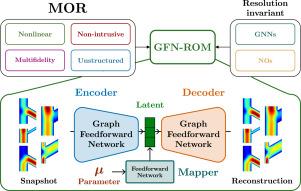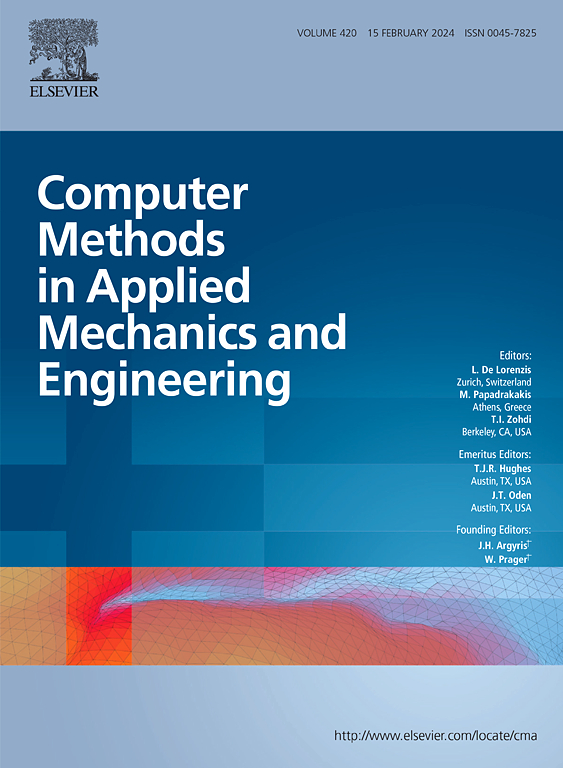GFN:用于多保真应用中分辨率不变的减算子学习的图前馈网络
IF 6.9
1区 工程技术
Q1 ENGINEERING, MULTIDISCIPLINARY
Computer Methods in Applied Mechanics and Engineering
Pub Date : 2024-10-22
DOI:10.1016/j.cma.2024.117458
引用次数: 0
摘要
这项工作为多保真应用提出了一种新颖的分辨率不变模型阶次缩减策略。通过在神经网络权重和网格节点之间建立直接联系,将前馈网络的概念扩展到图结构数据,从而增强了网络的可解释性。我们在基于自动编码器的参数化偏微分方程还原策略中利用了该方法在不同网格尺寸上进行训练和测试的能力。我们表明,这种扩展通过误差边界为性能提供了可证明的保证。我们在三个具有挑战性的基准上测试了所提出方法的能力,包括平流现象和具有高维参数空间的问题。与最先进的模型相比,该方法产生了一种更轻便、更灵活的策略,同时在单保真度和多保真度情况下都表现出卓越的泛化性能。本文章由计算机程序翻译,如有差异,请以英文原文为准。

GFN: A graph feedforward network for resolution-invariant reduced operator learning in multifidelity applications
This work presents a novel resolution-invariant model order reduction strategy for multifidelity applications. We base our architecture on a novel neural network layer developed in this work, the graph feedforward network, which extends the concept of feedforward networks to graph-structured data by creating a direct link between the weights of a neural network and the nodes of a mesh, enhancing the interpretability of the network. We exploit the method’s capability of training and testing on different mesh sizes in an autoencoder-based reduction strategy for parameterised partial differential equations. We show that this extension comes with provable guarantees on the performance via error bounds. The capabilities of the proposed methodology are tested on three challenging benchmarks, including advection-dominated phenomena and problems with a high-dimensional parameter space. The method results in a more lightweight and highly flexible strategy when compared to state-of-the-art models, while showing excellent generalisation performance in both single fidelity and multifidelity scenarios.
求助全文
通过发布文献求助,成功后即可免费获取论文全文。
去求助
来源期刊
CiteScore
12.70
自引率
15.30%
发文量
719
审稿时长
44 days
期刊介绍:
Computer Methods in Applied Mechanics and Engineering stands as a cornerstone in the realm of computational science and engineering. With a history spanning over five decades, the journal has been a key platform for disseminating papers on advanced mathematical modeling and numerical solutions. Interdisciplinary in nature, these contributions encompass mechanics, mathematics, computer science, and various scientific disciplines. The journal welcomes a broad range of computational methods addressing the simulation, analysis, and design of complex physical problems, making it a vital resource for researchers in the field.

 求助内容:
求助内容: 应助结果提醒方式:
应助结果提醒方式:


